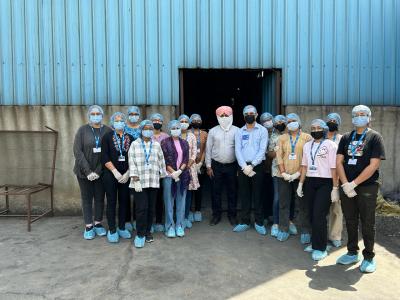Visit to Biomedical Waste Treatment Plant

IIS (Deemed to be University), Jaipur
Visit to Biomedical Waste Treatment Plant, Jaipur
Name of the Department: Environmental Science
Date & Day: 01.04.2024 (Monday)
Venue: Instromedix Common Biomedical Waste Treatment Plant, Khara No. 84, Gram Khori Ropada, Jaipur-Agra Highway, Jaipur
No. of Participants: 14
The objective of the Event: The objective of organizing the visit to the biomedical waste treatment plant was to provide postgraduate students with practical exposure to the management and treatment of biomedical waste. The visit aimed to enhance students' understanding of the processes involved in handling, treatment, and disposal of biomedical waste and to highlight the importance of proper waste management practices in safeguarding public health and environmental quality.
Description:
On 1st April 2024, a group of 14 postgraduate students of the Department of Environmental Science and Zoology, along with one faculty member (Dr. Ashish Tambi, Sr. Assistant Professor, Dept. of Environmental Science), participated in a visit to the common biomedical waste treatment plant managed by Instomedix Pvt. Ltd. in Jaipur. The visit commenced with a briefing session by the plant operator Mr. K.S. Sethi along with his assistant Mr. Guddu Yadav, who provided an overview of the facility's operations and highlighted the significance of proper biomedical waste management in mitigating health and environmental risks.
During the visit, students were guided through various sections of the treatment plant, including waste reception, segregation, disinfection, and disposal. They observed firsthand the segregation of different categories of biomedical waste, such as infectious, sharp, human and animal anatomical waste, to ensure safe handling and treatment. The tour also included demonstrations of the treatment processes, including autoclaving, chemical disinfection, and incineration, aimed at sterilizing and rendering the waste non-infectious.
Additionally, students learned about the importance of regulatory compliance and quality assurance measures in biomedical waste management, including documentation, record-keeping, and monitoring of treatment efficacy. They also had the opportunity to interact with plant staff and gain insights into the challenges and best practices in biomedical waste management.
The outcome of the event: The visit to the biomedical waste treatment plant proved to be highly informative and insightful for the participating students. It provided them with a comprehensive understanding of the complexities involved in managing biomedical waste and the critical role played by treatment facilities in ensuring public health and environmental protection. The firsthand exposure to the operational processes and technologies used in waste treatment enhanced students' knowledge and appreciation of the subject matter. Furthermore, the visit stimulated discussions among students on the importance of adopting sustainable waste management practices and the need for greater awareness and advocacy in this regard. It also inspired students to explore potential research opportunities and career paths in the fields of environmental science, waste management, and public health.
In conclusion, the visit to the biomedical waste treatment plant was a valuable educational experience that complemented classroom learning and provided students with practical insights into real-world environmental challenges and solutions. It underscored the department's commitment to experiential learning and capacity building in environmental science and allied disciplines.

